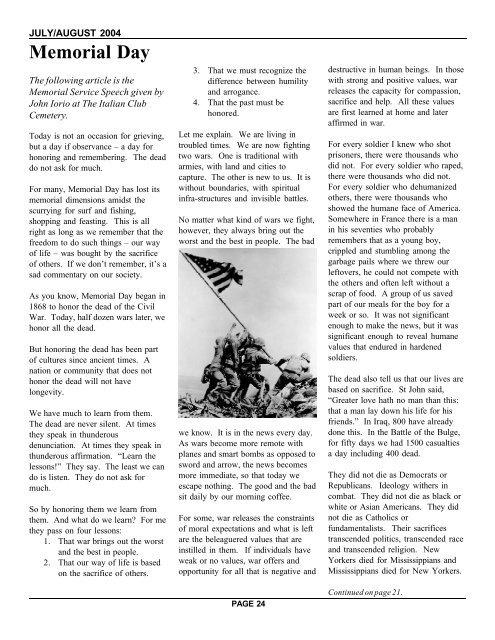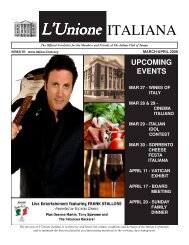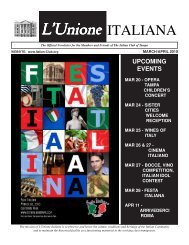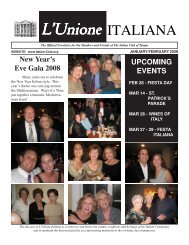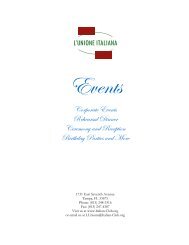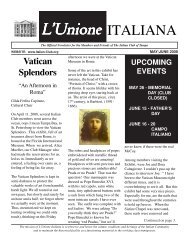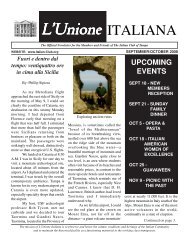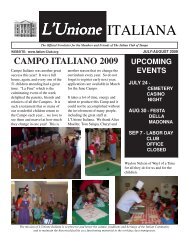VISIT US ON-LINE AT - The Italian Club of Tampa
VISIT US ON-LINE AT - The Italian Club of Tampa
VISIT US ON-LINE AT - The Italian Club of Tampa
Create successful ePaper yourself
Turn your PDF publications into a flip-book with our unique Google optimized e-Paper software.
JULY/AUG<strong>US</strong>T 2004<br />
Memorial Day<br />
<strong>The</strong> following article is the<br />
Memorial Service Speech given by<br />
John Iorio at <strong>The</strong> <strong>Italian</strong> <strong>Club</strong><br />
Cemetery.<br />
Today is not an occasion for grieving,<br />
but a day if observance – a day for<br />
honoring and remembering. <strong>The</strong> dead<br />
do not ask for much.<br />
For many, Memorial Day has lost its<br />
memorial dimensions amidst the<br />
scurrying for surf and fishing,<br />
shopping and feasting. This is all<br />
right as long as we remember that the<br />
freedom to do such things – our way<br />
<strong>of</strong> life – was bought by the sacrifice<br />
<strong>of</strong> others. If we don’t remember, it’s a<br />
sad commentary on our society.<br />
As you know, Memorial Day began in<br />
1868 to honor the dead <strong>of</strong> the Civil<br />
War. Today, half dozen wars later, we<br />
honor all the dead.<br />
But honoring the dead has been part<br />
<strong>of</strong> cultures since ancient times. A<br />
nation or community that does not<br />
honor the dead will not have<br />
longevity.<br />
We have much to learn from them.<br />
<strong>The</strong> dead are never silent. At times<br />
they speak in thunderous<br />
denunciation. At times they speak in<br />
thunderous affirmation. “Learn the<br />
lessons!” <strong>The</strong>y say. <strong>The</strong> least we can<br />
do is listen. <strong>The</strong>y do not ask for<br />
much.<br />
So by honoring them we learn from<br />
them. And what do we learn For me<br />
they pass on four lessons:<br />
1. That war brings out the worst<br />
and the best in people.<br />
2. That our way <strong>of</strong> life is based<br />
on the sacrifice <strong>of</strong> others.<br />
3. That we must recognize the<br />
difference between humility<br />
and arrogance.<br />
4. That the past must be<br />
honored.<br />
Let me explain. We are living in<br />
troubled times. We are now fighting<br />
two wars. One is traditional with<br />
armies, with land and cities to<br />
capture. <strong>The</strong> other is new to us. It is<br />
without boundaries, with spiritual<br />
infra-structures and invisible battles.<br />
No matter what kind <strong>of</strong> wars we fight,<br />
however, they always bring out the<br />
worst and the best in people. <strong>The</strong> bad<br />
we know. It is in the news every day.<br />
As wars become more remote with<br />
planes and smart bombs as opposed to<br />
sword and arrow, the news becomes<br />
more immediate, so that today we<br />
escape nothing. <strong>The</strong> good and the bad<br />
sit daily by our morning c<strong>of</strong>fee.<br />
For some, war releases the constraints<br />
<strong>of</strong> moral expectations and what is left<br />
are the beleaguered values that are<br />
instilled in them. If individuals have<br />
weak or no values, war <strong>of</strong>fers and<br />
opportunity for all that is negative and<br />
PAGE 24<br />
destructive in human beings. In those<br />
with strong and positive values, war<br />
releases the capacity for compassion,<br />
sacrifice and help. All these values<br />
are first learned at home and later<br />
affirmed in war.<br />
For every soldier I knew who shot<br />
prisoners, there were thousands who<br />
did not. For every soldier who raped,<br />
there were thousands who did not.<br />
For every soldier who dehumanized<br />
others, there were thousands who<br />
showed the humane face <strong>of</strong> America.<br />
Somewhere in France there is a man<br />
in his seventies who probably<br />
remembers that as a young boy,<br />
crippled and stumbling among the<br />
garbage pails where we threw our<br />
leftovers, he could not compete with<br />
the others and <strong>of</strong>ten left without a<br />
scrap <strong>of</strong> food. A group <strong>of</strong> us saved<br />
part <strong>of</strong> our meals for the boy for a<br />
week or so. It was not significant<br />
enough to make the news, but it was<br />
significant enough to reveal humane<br />
values that endured in hardened<br />
soldiers.<br />
<strong>The</strong> dead also tell us that our lives are<br />
based on sacrifice. St John said,<br />
“Greater love hath no man than this:<br />
that a man lay down his life for his<br />
friends.” In Iraq, 800 have already<br />
done this. In the Battle <strong>of</strong> the Bulge,<br />
for fifty days we had 1500 casualties<br />
a day including 400 dead.<br />
<strong>The</strong>y did not die as Democrats or<br />
Republicans. Ideology withers in<br />
combat. <strong>The</strong>y did not die as black or<br />
white or Asian Americans. <strong>The</strong>y did<br />
not die as Catholics or<br />
fundamentalists. <strong>The</strong>ir sacrifices<br />
transcended politics, transcended race<br />
and transcended religion. New<br />
Yorkers died for Mississippians and<br />
Mississippians died for New Yorkers.<br />
Continued on page 21.


